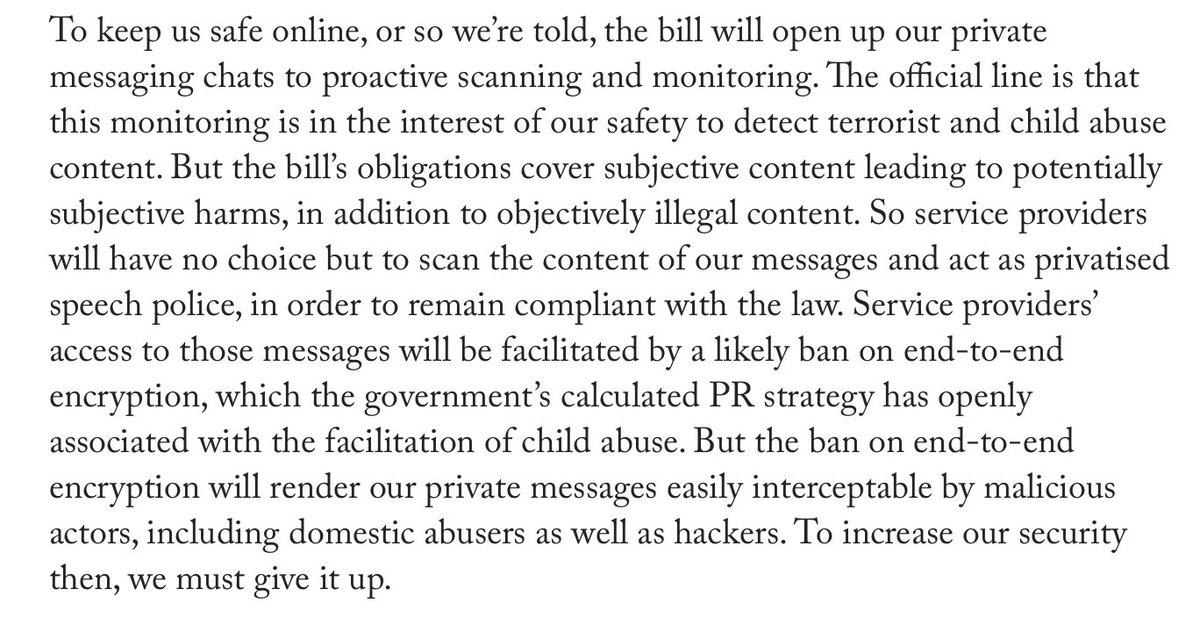So @DCMS_SecOfState wrote to @IpsoNews @NUJofficial @EditorsUK to tell them that uK press would be exempted from regulation for #onlineharms
*This is not true*—or only partly true—or impossible in practice. Let me explain why.
assets.publishing.service.gov.uk/government/upl…
*This is not true*—or only partly true—or impossible in practice. Let me explain why.
assets.publishing.service.gov.uk/government/upl…
1 Content from media will be posted to social media. When it arrives on FB, Twitter, etc, it becomes the problem of the regulated social media platform.
Imagine that a @DailyMailUK article is posted on Facebook, where it attracts controversial debate.
Imagine that a @DailyMailUK article is posted on Facebook, where it attracts controversial debate.
2 Imagine the controversial debate on FB strays into racist or sexist remarks that are now regulated as a "risk of harm".
What now does FB do to reduce the risk of harm?
How does FB treat other posts of this @DailyMailUK article to FB?
What now does FB do to reduce the risk of harm?
How does FB treat other posts of this @DailyMailUK article to FB?
3 Very likely, @Facebook would suppress the @DailyMailUK content in some way. Posts could be reduced in circulation, perhaps comments would be removed or interaction mechanically reduced.
The reach of @DailyMailUK's article would be hit and revenues reduced.
The reach of @DailyMailUK's article would be hit and revenues reduced.
4 You might think that perhaps @DailyMailUK might be exempted in some way on @Facebook: but this is not realistic.
If the regulator did this, then it would create an invite to every troll to only post racism, sexism or whatever else in the context of a UK media post.
If the regulator did this, then it would create an invite to every troll to only post racism, sexism or whatever else in the context of a UK media post.
5 Then think about the longer term. Today, @Facebook and @DailyMirror or @DailyMailUK seem quite different.
But is @GuidoFawkes or @novaramedia or @TheCanaryUK really so different from @Independent ? How so?
What happens when papers (like @Independent ) ditch paper editions?
But is @GuidoFawkes or @novaramedia or @TheCanaryUK really so different from @Independent ? How so?
What happens when papers (like @Independent ) ditch paper editions?
6 Perhaps the government could identify newspapers as those subject to a "media regulator".
That sounds like publisher can only be publishers if they are regulated: something @EditorsUK have resisted elsewhere. De facto, you have approved government regulators by the backdoor.
That sounds like publisher can only be publishers if they are regulated: something @EditorsUK have resisted elsewhere. De facto, you have approved government regulators by the backdoor.
7 Long term, the difference between nearly every Internet site and a handful of press websites is a difference without a distinction.
And if you can have a state regulator for #onlineharms governing the speech of millions of UK citizens: then why not for @EditorsUK?
And if you can have a state regulator for #onlineharms governing the speech of millions of UK citizens: then why not for @EditorsUK?
So I say to @IpsoNews @NUJofficial @EditorsUK:
Do not trust this promise to keep you out of #onlineharms regulation.
Your content will be regulated on third party platforms, it is impossible to avoid this in practice.
Long term you will be subject to it, or other regulation.
Do not trust this promise to keep you out of #onlineharms regulation.
Your content will be regulated on third party platforms, it is impossible to avoid this in practice.
Long term you will be subject to it, or other regulation.
• • •
Missing some Tweet in this thread? You can try to
force a refresh












